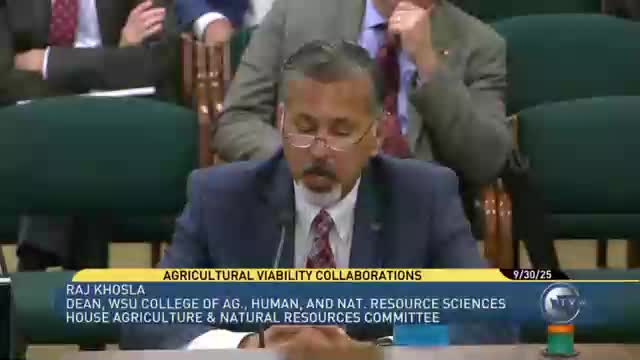WSU Faculty Discuss Precision Agriculture Challenges and Innovations in Washington State
September 30, 2025 | Legislative Sessions, Washington
This article was created by AI summarizing key points discussed. AI makes mistakes, so for full details and context, please refer to the video of the full meeting. Please report any errors so we can fix them. Report an error »

Washington's agricultural sector is poised for a technological transformation as discussions at the recent House Agriculture & Natural Resources meeting highlighted the critical need for improved broadband connectivity and the adoption of precision agriculture.
During the meeting, representatives emphasized the potential of precision agriculture to enhance productivity, particularly in a state known for its diverse and high-value crops. However, challenges such as labor shortages and the high costs of technology were identified as significant barriers to adoption. A key focus was on the necessity of state support to ensure that rural communities can access the latest agricultural technologies, which are essential for optimizing production and addressing labor challenges.
One innovative solution discussed was the development of low-cost, biodegradable sensors that can monitor soil moisture levels. These sensors, which could be produced for less than a dollar each, would allow farmers to make informed decisions about water usage, especially in light of recent drought conditions in Washington. The integration of such technology could significantly reduce costs associated with water management and improve crop yields.
The meeting also addressed the importance of education and training for the next generation of agricultural professionals. With declining enrollment in agricultural programs, there is a pressing need for state investment to empower students and ensure they are equipped to tackle modern agricultural challenges.
As Washington's agricultural landscape evolves, the collaboration between state leaders, educational institutions, and the agricultural community will be crucial in fostering innovation and ensuring that farmers can effectively utilize precision agriculture techniques. The discussions at this meeting signal a commitment to enhancing the state's agricultural resilience and productivity through technology and education.
During the meeting, representatives emphasized the potential of precision agriculture to enhance productivity, particularly in a state known for its diverse and high-value crops. However, challenges such as labor shortages and the high costs of technology were identified as significant barriers to adoption. A key focus was on the necessity of state support to ensure that rural communities can access the latest agricultural technologies, which are essential for optimizing production and addressing labor challenges.
One innovative solution discussed was the development of low-cost, biodegradable sensors that can monitor soil moisture levels. These sensors, which could be produced for less than a dollar each, would allow farmers to make informed decisions about water usage, especially in light of recent drought conditions in Washington. The integration of such technology could significantly reduce costs associated with water management and improve crop yields.
The meeting also addressed the importance of education and training for the next generation of agricultural professionals. With declining enrollment in agricultural programs, there is a pressing need for state investment to empower students and ensure they are equipped to tackle modern agricultural challenges.
As Washington's agricultural landscape evolves, the collaboration between state leaders, educational institutions, and the agricultural community will be crucial in fostering innovation and ensuring that farmers can effectively utilize precision agriculture techniques. The discussions at this meeting signal a commitment to enhancing the state's agricultural resilience and productivity through technology and education.
View full meeting
This article is based on a recent meeting—watch the full video and explore the complete transcript for deeper insights into the discussion.
View full meeting
